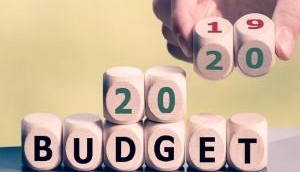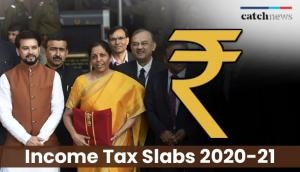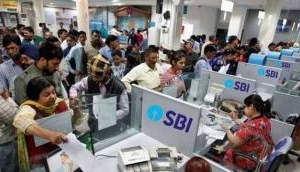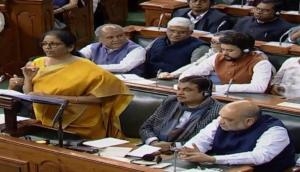
The decision
- Finance Minister Arun Jaitley has decided to introduce a tax that will make salaried persons sweat
- When you withdraw deposits made under EPF and pension schemes, interest earned on 60% of the deposits will be taxed
- The only way you can avoid this tax is by investing in annuity products like pension funds
More in the story
- How trade unions have reacted to the decision
- Does it make any sense to invest in EPF anymore?
- The impact on household savings, and consequently, India\'s GDP
In his last two budgets, Finance Minister Arun Jaitley has not given anything to the middle class. The income tax slabs have also not been reduced, owing to the lack of revenue generation.
But now, the government has made a decision that will make salaried persons sweat. When you withdraw your deposits made under the Employees' Provident Fund (EPF) and National Pension System (NPS) schemes, the interest earned on 60% of the deposits will now be taxed.
Read: You think this Budget was for farmers? Think again
In his budget speech on 29 February, Jaitley said that 40% of the total corpus withdrawn at the time of retirement will be tax exempt. This means that the remaining would be taxable, unless the amount is invested in an annuity product like pension funds.
But even if the government is taxing only the interest on 60% of the corpus, the question is, why should people save money throughout their lives only to be taxed in the end?
Help for start-ups at the cost of the middle class
Employers are required to contribute 12% of basic wages towards an employee's pension, or PF account, under the social security schemes run by the EPF Organisation.
Interestingly, while on one hand, the government is taxing the middle class, it has also given relief to start-up companies. It has offered to pay 8.33% of their contribution (for three years) when new employees enroll in EPF.
Interest earned on 60% of deposits made under EPF or pension schemes will be taxed at withdrawal
Also, unlike in the past, if an employer pays over Rs 1.5 lakh towards a worker's EPF account in a year, the government has decided to tax that too. There was no limit in the past.
Logic behind the tax
In a clarification released on Tuesday, the government has said the following things:
- The purpose of this reform of making the change in tax regime is to encourage more number of private sector employees to go for pension security after retirement, instead of withdrawing the entire money from the Provident Fund account.
- It is expected that the employees of private companies will place the remaining 60% of the corpus in annuity, out of which they can get regular pension. When this 60% of the remaining corpus is invested in annuity, no tax is chargeable. So what it means is that the entire corpus will be tax free, if invested in annuity.
- The main category of people for whom EPF scheme was created are the members of EPFO, who are within the statutory wage limit of Rs 15,000 per month. Out of around 3.7 crore contributing members of EPFO as of today, around 3 crore subscribers are in this category. For this category of people, there is not going to be any change in the new dispensation.
'No right to tax'
The CPI(M)'s Rajya Sabha MP, Tapan Sen, has criticised the move.
"The government has no right to tax the lifelong savings of an individual, which have been accumulated through hardships. People can spend that money at the time of earning. But they save it only for their retirement, when they have to face many family responsibilities. Why should the government come and tell the person - 'invest that money in NPS or be taxed'?" he said.
Also read- Explained: Arun Jaitley's '9 pillars' of #Budget2016
Trade unions are also up in arms against the decision. As many as 11 central trade unions plan to go on a nationwide strike on 10 March to protest against it.
According Gurudas Dasgupta, general secretary, All India Trade Union Congress: "You are forcing people not to save in your attempt to bring in parity with the NPS (National Pension Scheme)."
Impact on household savings
A major reason for the fall in India's growth rate has been attributed to the falling household savings rate as a ratio to the GDP.
According to R Nagaraj, professor at the Indira Gandhi Institute of Development Research (IGIDR), in order to achieve a 10% growth rate with modest and stable inflation, India needs to step up its domestic savings rate, which has now declined to 29-30% of the GDP from 33-34% of the GDP during the boom last decade.
"Why should the govt tell the person - 'invest that money in NPS or be taxed'?" CPI(M) MP Tapan Sen
By taxing the EPF savings, the government is risking India's household savings rate. Does it make sense to just promote a financial instrument like NPS? The ball is now in the people's court - only they can decide if they want to continue investing in the EPF, despite the taxation.
Edited by Shreyas Sharma
More in Catch:
The Naked Truth: army candidates write exam in their underwear
All eyes on the US: will today be the day Donald Trump becomes unstoppable?
Ishrat Jahan: who is right, Chidambaram or Pillai? The truth may never come out
Opposition guns for MoS HRD Katheria for his alleged hate speech
First published: 2 March 2016, 9:53 IST







![BJP's Kapil Mishra recreates Shankar Mahadevan’s ‘Breathless’ song to highlight Delhi pollution [WATCH] BJP's Kapil Mishra recreates Shankar Mahadevan’s ‘Breathless’ song to highlight Delhi pollution [WATCH]](https://images.catchnews.com/upload/2022/11/03/kapil-mishra_240884_300x172.png)

![Anupam Kher shares pictures of his toned body on 67th birthday [MUST SEE] Anupam Kher shares pictures of his toned body on 67th birthday [MUST SEE]](https://images.catchnews.com/upload/2022/03/07/Anupam_kher_231145_300x172.jpg)






